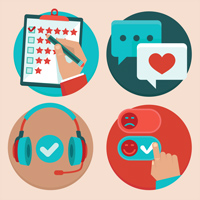
Consumer behavior evaluations take a closer look at motivations, reasoning and actions that go into purchase decisions. Understanding the aspects of consumer behavior and the methods of study provide valuable insight for your own business and offer important techniques for driving your business to the next level of success.
Customer Behavior
The psychology behind consumer behavior has been widely studied, regarding both the reasoning for purchase and the contributing factors that can influence the decision. When making a purchase, most consumers don’t stop and think about why they do what they do, but the reasoning is a combination of several aspects.
Research has found three basic reasons for making purchases:
- Necessity – Food, shelter, basic clothing, health care, childcare, etc.
- Social status symbol – Trendy clothing, expensive cars, large houses
- Gifts – Purchases made with the intent of gifting to others.
Research has also found three reasons for which consumers do not buy products:
- Lack of necessity – Consumer does not need it, so they do not buy it.
- Financial deficiency – The money (or credit) is simply not there for purchases.
- Dislike – Consumer does not like the product.
How Is Consumer Behavior Studied?
Over time, social researchers have developed many methods of studying consumers and the behaviors that drive purchase decisions. The research falls into two categories. Primary research is designed and conducted by an individual or organization, and secondary research uses information that others have conducted to draw new or different conclusions.
Some typical primary research methods include:
- Surveys – Surveys are ideal for gathering a large amount of specific information, whether containing open-ended questions (What state are you from?) or multiple choice (Are you married? Yes or No). Surveys can be mailed, emailed or conducted in person.
- Sample – Offering samples of new products to consumers is an excellent way to gauge what will (or won’t) work. Most people will offer their honest opinion if given a free sample or incentive.
- Focus Groups – Focus groups are particularly useful for testing new products or making changes to existing product, allowing a group to discuss a certain idea or product and gathering data from the conversations that transpire.
- Personal Interviews – A personal interview can gather very in-depth information from a consumer, but can be very costly and time-consuming.
- Observation – Simple observation can often provide the most honest opinions from a consumer, whether it is observing an online marketplace or a physical store space.
- Online Research – Pop-up surveys are becoming more common; gathering data from consumers through data forms during online shopping or purchase. Online data can also be gathered by monitoring page visits and behavior on a website.
- Scanned Data – Many stores are using ‘frequent shopper’ or ‘VIP’ cards to encourage shoppers to become regulars, but these cards are also used to gather data about the types and frequencies of purchases made by certain groups of people.
A few examples of secondary research methods include:
- Books – Researched and scholarly works of literature offer excellent sources for information.
- Internet publications – Credible, authoritative research can be found online, and should be used sparingly and fact checked
- Research reports – Tested information conducted by credible professionals can offer first-rate insight.
Evaluating Consumer Behavior to Boost Your Own Business
While many research methods can be costly, some can be quickly and inexpensively applied to your own business. Using consumer behavior research can give your business a leg up on the competition.
- Poll your clients or customers. Ask simple questions to get quick answers, including topics such as customer satisfaction and desired product or service changes, and use the feedback to better serve your customers.
- Analyze online activity on your business website to learn what customers are looking for or revisiting. Use the information to develop a more appealing, user-friendly website, which can really boost your business efforts.
- Offer a free sample of a product. Whether it’s a new type of fabric softener or an online marketing platform, consumers who are able to try a product will give honest feedback, offering you an invaluable device for bettering your business.
- Observe your clients. Train yourself to look for clues as to why they are likely purchasing what they are purchasing.
For a business to succeed it is imperative to know your target consumer, their motivations and their triggers for purchase. Developing a proactive way to evaluate consumer behavior should be a key to any business plan. A Master of Business Administration degree from Benedictine University online can offer insight into learning more about consumer behavior and research methodology to assist businesses in achieving their objectives.
Related Benedictine Programs
Benedictine’s online MBA provides an environment to apply critical thought against real world situations. To learn more about how Benedictine’s online MBA can expose you to lessons on critical throught and advance your career click here or speak to one of our Program Advisors who can share more with you about the program and curriculum.

